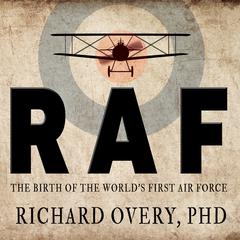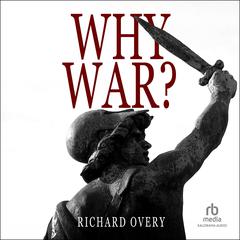 Play Audiobook Sample
Play Audiobook Sample
1939: Countdown to War Audiobook
 Play Audiobook Sample
Play Audiobook Sample
Quick Stats About this Audiobook
Total Audiobook Chapters:
Longest Chapter Length:
Shortest Chapter Length:
Average Chapter Length:
Audiobooks by this Author:
Publisher Description
On August 24, 1939, the world held its collective breath as Hitler and Stalin signed the now infamous nonaggression pact, signaling an imminent invasion of Poland and daring Western Europe to respond. In this dramatic account of the final days before the outbreak of World War II, award-winning historian Richard Overy vividly chronicles the unraveling of peace, hour by grim hour, as politicians and ordinary citizens brace themselves for a war that could spell the end of European civilization. Nothing was entirely predictable or inevitable. The West hoped that Hitler would see sense if they stood firm. Hitler was convinced the West would back down. Moments of uncertainty alternated with those of confrontation; secret intelligence was used by both sides to support their hopes. The one constant feature was the determination of Poland, a country created only in 1919, to protect its newfound independence against a vastly superior enemy. 1939 documents a defining moment in the violent history of the twentieth century.
Download and start listening now!
"A very good analysis of the last days of august 1939 prior to the beginning of hostilities between Germany and Poland. It provides a lot of useful information about policies and decisions made in time of extreme conditions."
— Luc (5 out of 5 stars)
Quotes
-
Simon Prebble's crisp British accent and pleasant, slightly gruff voice fit the no-nonsense reportage and occasional analysis of a dreadfully serious historical moment.... This is what listeners of serious nonfiction want: an intelligent book intelligently read.
— AudioFile
1939 Listener Reviews
-
" "As with all books by this author, very well written and with solid analysis." "
— Steve, 10/18/2013 -
" If you are interested in World War II this is the book for you. "
— Amy, 6/13/2012 -
" This brief 124 page book, easily readable in one day, is a fascinating fast-paced journey through day-to-day diplomacy during the two weeks before the outbreak of World War Two. "
— Steve, 5/8/2012
About Richard Overy
Richard Overy is a professor of history at the University of Exeter in the United Kingdom and one of Britain’s most distinguished historians and an internationally renowned scholar of World War II. He is the recipient of the Hessell-Tiltman Prize, the Wolfson History Prize, the Samuel Eliot Morison Prize, and he is a Fellow of the British Academy and the Royal Historical Society. His many works include The Bombing War, Dictators, and The Morbid Age.







